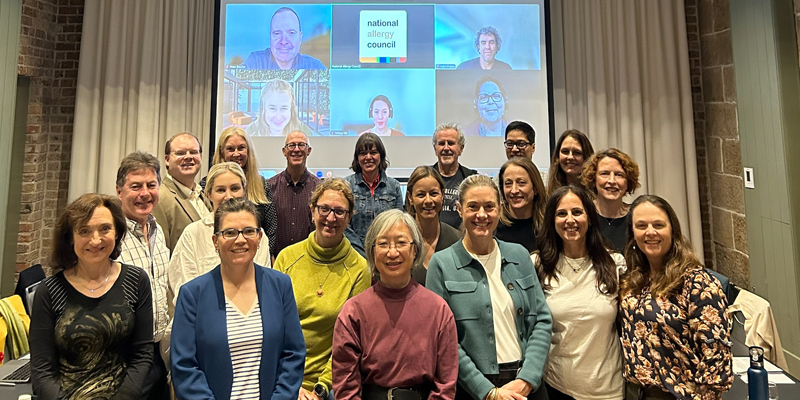Shared Care for Allergy Bulletin August 2024 - Edition 8
Welcome to the 8th Edition of the Shared Care for Allergy Bulletin! We are excited to keep you informed about the latest developments with the Shared Care for Allergy project. Our goal is to improve access to care for people living with allergic conditions.
Latest progress
We are in the implementation phase of the Shared Care for Allergy project. The Shared Care for Allergy Implementation Roadmap outlines key activities that the National Allergy Council, the Australasian Society of Clinical Immunology and Allergy (ASCIA), and Allergy & Anaphylaxis Australia are progressing to improve access to care. Read on for the latest updates on these activities.
![]() Consumer consultation to inform programs and resources
Consumer consultation to inform programs and resources
Allergy & Anaphylaxis Australia has been actively seeking feedback through discussions at community events and surveys to understand the best ways to provide information and support to people from diverse cultural and language backgrounds. They have uncovered that the main challenges for people are: 1) finding correct and trusted information about allergies, and 2) what their family, friends and community understood about allergy. Allergy & Anaphylaxis Australia are hosting online allergy discussion groups to better understand people's experiences with allergy and improve their support and resources. In June, Allergy & Anaphylaxis Australia staff visited Toowoomba (a regional centre in Queensland) to talk to the community and health professionals about allergy. Allergy & Anaphylaxis Australia have held free webinars on Food Allergen Labelling and Understanding Drug Allergy with expert presenters because people with allergies and their carers wanted to learn more about these topics.![]() Allergy training for regional and rural doctors and other healthcare professionals
Allergy training for regional and rural doctors and other healthcare professionals
ASCIA is supporting the development of new training resources and programs that will improve access and timely delivery of allergy education and training for health professionals. Training proposals have been developed to boost allergy training opportunities for regional and rural doctors and other healthcare professionals. ASCIA has listed the successful proposals on its website and an announcement will be made at the ASCIA 2024 Conference in early September.
![]()
Application for an MBS item number for food challenges
ASCIA and the National Allergy Council have worked together on an application to the Government for a Medicare Benefits Schedule (MBS) item number for food challenges, which was lodged in July 2024. Having an MBS item number for food challenges would mean that more challenges could be performed in private practice and patients can get a Medicare rebate meaning there would be less out of pocket expense for the patient. It is hoped that this will shorten the wait list for challenges performed by public allergy services.
![]()
Pilot of the Eczema ConnectTM program
Allergy & Anaphylaxis Australia have partnered with Perth Children’s Hospital (PCH) and the University of Western Australia (UWA) to trial a parent education and support program that will provide information about basic eczema management while they wait for an appointment with a PCH specialist. Ethics approval has been granted and recruitment through PCH will start soon.
![]()
Establish an allergy advice platform for healthcare professionals
The National Allergy Council has partnered with the Australian College of Rural and Remote Medicine (ACRRM) to establish a national online service for rural doctors to get advice from a clinical immunology/allergy specialist. Rural doctors will be able to get the specialist advice and support they need to manage patients closer to home. It is anticipated that the service will be available from February 2025.
![]()
Standards of care for transitioning from children’s allergy services to adult allergy services
The National Allergy Council is preparing to release a new standard of care focusing on the transition of paediatric (child) patients to adult allergy services in the public hospital system. The National Allergy Council and ASCIA are working together to prepare the Heads of Allergy Departments with guides and tools to support them to do this well.
Shared Care Working Group meeting in Sydney
The Shared Care Working Group meet twice a year in person over a full day for in-depth discussions on the strategic direction and oversight of the Shared Care for Allergy project. The Working Group members represent different health professional groups and peak bodies including the Royal Australian College of General Practitioners, the Australian College of Rural and Remote Medicine, Dietitians Australia, Remote and Isolated Health Workforce (CRANAplus), the Australian Paediatric Society, the Australasian College of Emergency Medicine, the Australian Psychological Society, the Pharmaceutical Society of Australia, as well as representation from the Consumers Health Forum, ASCIA, and Allergy & Anaphylaxis Australia.
Bringing together this diverse group offers a broad range of perspectives on what the best allergy care looks like, solutions to improve access, and their vision for future allergy training. Thank you to the Project Co-Leads, Dr Katie Frith and Ms Maria Said AM, and the Shared Care Working Group for helping us to improve access to allergy care in Australia.

Pictured: Members of the Shared Care for Allergy Working Group and staff from the National Allergy Council, ASCIA, and Allergy & Anaphylaxis Australia at a meeting in Sydney on Saturday 10 August 2024.
Promoting patient and carer support organisations
All ASCIA website information for patients and carers has been updated to include links to Allergy & Anaphylaxis Australia and other patient and carer support organisations. For more information visit the ASCIA website.
Contact the National Allergy Council
To contact us, please email
Find out more about the National Allergy Council.
Stay informed about the National Allergy Council
Stay informed by remaining subscribed to our newsletters and follow us on social media via Facebook, LinkedIn or Instagram.

